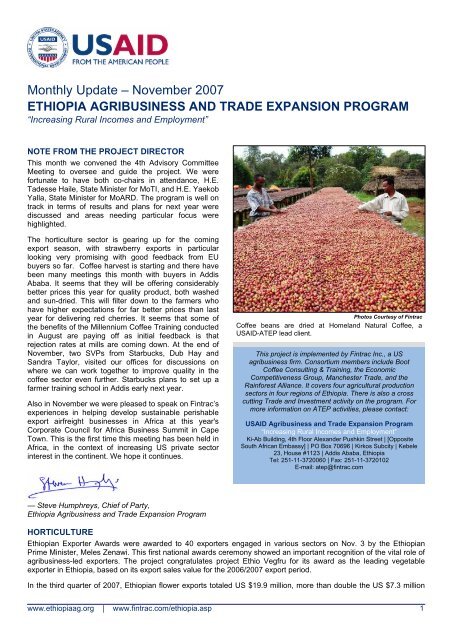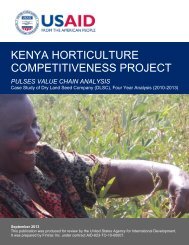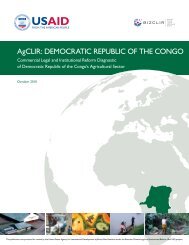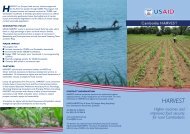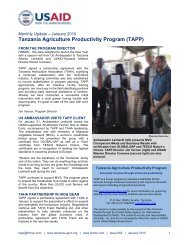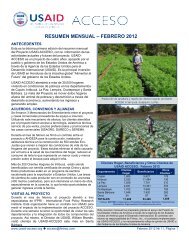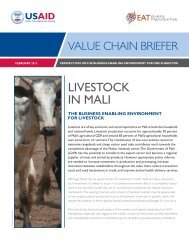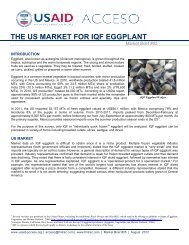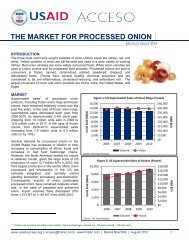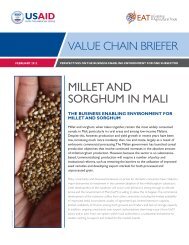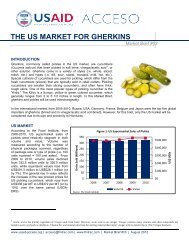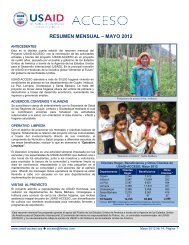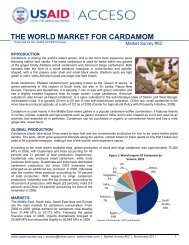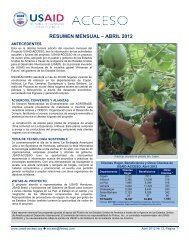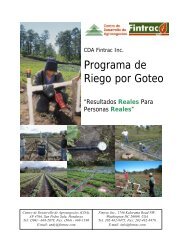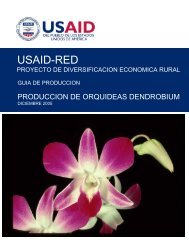NOTE FROM THE PROJECT DIRECTOR - Fintrac Inc.
NOTE FROM THE PROJECT DIRECTOR - Fintrac Inc.
NOTE FROM THE PROJECT DIRECTOR - Fintrac Inc.
Create successful ePaper yourself
Turn your PDF publications into a flip-book with our unique Google optimized e-Paper software.
Monthly Update – November 2007<br />
ETHIOPIA AGRIBUSINESS AND TRADE EXPANSION PROGRAM<br />
“<strong>Inc</strong>reasing Rural <strong>Inc</strong>omes and Employment”<br />
<strong>NOTE</strong> <strong>FROM</strong> <strong>THE</strong> <strong>PROJECT</strong> <strong>DIRECTOR</strong><br />
This month we convened the 4th Advisory Committee<br />
Meeting to oversee and guide the project. We were<br />
fortunate to have both co-chairs in attendance, H.E.<br />
Tadesse Haile, State Minister for MoTI, and H.E. Yaekob<br />
Yalla, State Minister for MoARD. The program is well on<br />
track in terms of results and plans for next year were<br />
discussed and areas needing particular focus were<br />
highlighted.<br />
The horticulture sector is gearing up for the coming<br />
export season, with strawberry exports in particular<br />
looking very promising with good feedback from EU<br />
buyers so far. Coffee harvest is starting and there have<br />
been many meetings this month with buyers in Addis<br />
Ababa. It seems that they will be offering considerably<br />
better prices this year for quality product, both washed<br />
and sun-dried. This will filter down to the farmers who<br />
have higher expectations for far better prices than last<br />
year for delivering red cherries. It seems that some of<br />
the benefits of the Millennium Coffee Training conducted<br />
in August are paying off as initial feedback is that<br />
rejection rates at mills are coming down. At the end of<br />
November, two SVPs from Starbucks, Dub Hay and<br />
Sandra Taylor, visited our offices for discussions on<br />
where we can work together to improve quality in the<br />
coffee sector even further. Starbucks plans to set up a<br />
farmer training school in Addis early next year.<br />
Also in November we were pleased to speak on <strong>Fintrac</strong>’s<br />
experiences in helping develop sustainable perishable<br />
export airfreight businesses in Africa at this year's<br />
Corporate Council for Africa Business Summit in Cape<br />
Town. This is the first time this meeting has been held in<br />
Africa, in the context of increasing US private sector<br />
interest in the continent. We hope it continues.<br />
— Steve Humphreys, Chief of Party,<br />
Ethiopia Agribusiness and Trade Expansion Program<br />
Photos Courtesy of <strong>Fintrac</strong><br />
Coffee beans are dried at Homeland Natural Coffee, a<br />
USAID-ATEP lead client.<br />
This project is implemented by <strong>Fintrac</strong> <strong>Inc</strong>., a US<br />
agribusiness firm. Consortium members include Boot<br />
Coffee Consulting & Training, the Economic<br />
Competitiveness Group, Manchester Trade, and the<br />
Rainforest Alliance. It covers four agricultural production<br />
sectors in four regions of Ethiopia. There is also a cross<br />
cutting Trade and Investment activity on the program. For<br />
more information on ATEP activities, please contact:<br />
USAID Agribusiness and Trade Expansion Program<br />
“<strong>Inc</strong>reasing Rural <strong>Inc</strong>omes and Employment”<br />
Ki-Ab Building, 4th Floor Alexander Pushkin Street | [Opposite<br />
South African Embassy] | PO Box 70696 | Kirkos Subcity | Kebele<br />
23, House #1123 | Addis Ababa, Ethiopia<br />
Tel: 251-11-3720060 | Fax: 251-11-3720102<br />
E-mail: atep@fintrac.com<br />
HORTICULTURE<br />
Ethiopian Exporter Awards were awarded to 40 exporters engaged in various sectors on Nov. 3 by the Ethiopian<br />
Prime Minister, Meles Zenawi. This first national awards ceremony showed an important recognition of the vital role of<br />
agribusiness-led exporters. The project congratulates project Ethio Vegfru for its award as the leading vegetable<br />
exporter in Ethiopia, based on its export sales value for the 2006/2007 export period.<br />
In the third quarter of 2007, Ethiopian flower exports totaled US $19.9 million, more than double the US $7.3 million<br />
www.ethiopiaag.org | www.fintrac.com/ethiopia.asp 1
earned from flower exports in the same quarter last<br />
year. This year, flower exports are expected to reach<br />
1.8 million stems valued at US $167 million. During the<br />
next five years, the Chairman of EHPEA quantified the<br />
vision for the horticulture industry’s growth during the<br />
Exporters Award Ceremony as follows, “Annual export<br />
sales of $1.4 billion by 2012, employing 1.5 million<br />
people, engaging 50,000 small-scale growers, with 450<br />
hectares under flower production and 750 hectares<br />
dedicated to fruit and vegetables.”<br />
Such ambitious growth targets will require additional<br />
freight and logistics capacity. In response to this need,<br />
USAID-ATEP co-sponsored along with The Royal<br />
Netherlands Embassy, Maersk-Ethiopia and EHPEA a<br />
Refrigerated Container Business Forum. Presentations<br />
and discussions were held on the viability and potential<br />
of sea freight in terms of cost effectiveness and<br />
capacity to serve as an alternative to air freight for<br />
servicing the European and Middle Eastern markets.<br />
The project also signed a memorandum of<br />
understanding with Melkassa Agricultural Research<br />
Center (MARC) to manage new trials and conduct a<br />
horticulture field day in June 2008. This will<br />
demonstrate new disease-resistant and high-yielding<br />
hybrid vegetable seeds to project clients and other<br />
Ethiopian farmers.<br />
USAID-ATEP co-financed the first pilot project in<br />
Ethiopia using biological control techniques<br />
(Phytoseiulus persimilis) on strawberries at Ilan Tot<br />
farm, in conjunction with technical assistance and<br />
monitoring from Bio-Bee of Israel and the Research<br />
Center at Debrezeit. This is expected to limit the use of<br />
acaricides and improve yields. The project has also<br />
conducted Food Safety and HACCP training at the<br />
farm as part of a support package to expand<br />
supermarket sales to European consumers.<br />
Monthly Update – November 2007<br />
Ethiopia Agribusiness and Trade Expansion Program<br />
Photos Courtesy of <strong>Fintrac</strong><br />
Emil Van Wyk, a grape consultant from South Africa, and<br />
USAID-ATEP agronomist Semret Kifleyesus, provide<br />
technical assistance for program client Almeta Farm.<br />
Asnaketch Thomas at Amaro Gayo, a coffee processor.<br />
The project sponsored a grape consultant from South Africa to conduct field visits to three grape grower project clients<br />
(Almeta Impex, Elfora and Luna Farm). The focus on technical training on agronomy and related issues helped to<br />
define critical next steps in the development of this new crop. Similar training on strawberry production, postharvest<br />
handling techniques and agronomy skills was provided to 14 participants from lead clients farms and MoARD<br />
extension specialists, and helped define a general strategy for berry fruit development in Ethiopia.<br />
SPECIALTY COFFEE<br />
Major activities this month focused on harvesting, processing and marketing. USAID-ATEP carried out cupping<br />
training for 10 trainees from Teppi, Mizan and Gemadro Coffee Plantation. Additional training events took place in<br />
Yirgacheffe and Sidamo for 109 farmers and coffee processing operators. In addition, 12 wet mills were visited and<br />
provided technical support.<br />
USAID-ATEP conducted a workshop on the “Q” Market Program for 36 participants from the private sector and<br />
government. The workshop was organized to familiarize the Ethiopian coffee industry with the Q program and its<br />
capacity for establishing specialty designation and price premiums for high-quality coffees from Ethiopia.<br />
To certify the first Q graders in Ethiopia, USAID-ATEP organized training with the Ethiopian Coffee Exporters<br />
Association. This follows the first part of the training conducted in September.<br />
For the first time, ECEA organized the 8th coffee stakeholders’ forum on its own initiative. It is a promising<br />
development showing that stakeholders are coming forward to lead the forum. A working group has been assigned to<br />
www.ethiopiaag.org | www.fintrac.com/ethiopia.asp 2
plan the next training program following the highly<br />
successful Millennium Training in August.<br />
In marketing, the project assisted the Bench Maji Forest<br />
Coffee Union prepare samples for buyers from the<br />
European market. The union sold one container of<br />
washed coffee at $1.81/pound, f.o.b.<br />
HIDES, SKINS AND LEA<strong>THE</strong>R<br />
USAID-ATEP facilitated the supply of 5,000 raw hides<br />
and skins from Bench Maji, SNNPR, valued at<br />
US$15,000 to the Ethiopian leather industry. Until now,<br />
the region did not make much use of its resources. This<br />
link was established following the hides/skins harvesting<br />
training conducted in November 2006.<br />
This month also saw the inauguration of the 30<br />
hides/skins collection centers in Addis Ababa. Besides<br />
improving hide and skin quality, the centers will create<br />
employment opportunities for hundreds of trainers and<br />
operators, and increase the sales for thousands of rural<br />
producers.<br />
TAYTU’s showcase and office was finalized this month.<br />
The furnishings, including computers, printers, desks<br />
and product display racks, were installed in the<br />
consortium office at the premises of Dembel City Center,<br />
Addis Ababa. TAYTU has placed orders with its<br />
members for its summer collections. The consortium<br />
members will create job opportunities for more than 500<br />
people and average sales are estimated to be US$3,500<br />
per month through the new retail outlet.<br />
Monthly Update – November 2007<br />
Ethiopia Agribusiness and Trade Expansion Program<br />
Photos Courtesy of <strong>Fintrac</strong><br />
An inauguration ceremony for one of the HSL collection<br />
centers in Addis Ababa.<br />
During November, business plans of Jonzo Footwear, Trainees for raw HS management show off their certificates.<br />
Cro Leather and Wondi Trading were reviewed. Wondi<br />
Trading has designed a strategy to establish a primary<br />
leather processing unit in five years and has applied to<br />
secure funding from a USAID credit guarantee program. Jonzo Footwear is planning to produce up to 4,500 pairs of<br />
women’s footwear for export to the international market. When production begins, Jonzo will be the first producer and<br />
exporter of women’s footwear from Ethiopia. Cro Leather is establishing a hides and skins upgrading plant to process<br />
low-grade, semi-processed hides and skins that do not meet export standards. These rejected hides and skins will be<br />
of better value for manufacturing accessories or other leather goods for local and international export markets. Cro<br />
Leather has applied for credit guarantee cover through the USAID program for 50 percent of the fixed investment.<br />
OILSEEDS AND PULSES<br />
USAID-ATEP conducted a preliminary assessment on sesame production and marketing in North Gondar, Amhara<br />
region. The district is the center of the sesame market for the Amhara region as well as Humera. The assessment<br />
identified major problems with the sesame market, and further work will include recommendations to start and<br />
facilitate clustering.<br />
Information on the market situation and sesame yields was gathered from USAID-ATEP lead client farms<br />
(Gebreyohanes Asgedom, Abraha Hailu, Tetemke Tsegay, Kafta Humera Farmers Association, Setit Humera<br />
Cooperative Union).<br />
A memorandum of understanding was signed with the Ethiopian Institute of Agriculture Research (EIAR) on basic<br />
haricot bean seed multiplication. A field visit was conducted at EIAR’s Melkassa Agricultural Research Center (MARC)<br />
to follow up haricot bean harvesting and discuss with agronomists and farm managers the cleaning, storage and sales<br />
distribution of the seed.<br />
A field visit was held at Alemtena and Meki, major haricot bean growing areas, with Catholic Relief Service (CRS) and<br />
discussions were held with producers, development agents and traders regarding haricot production, quality and<br />
www.ethiopiaag.org | www.fintrac.com/ethiopia.asp 3
USAID-ATEP Staff<br />
Main office<br />
Steve Humphreys, Chief of Party<br />
shumphreys@fintrac.com<br />
Atsede Yohannes, Project Accountant<br />
atsede@fintrac.com<br />
Meheret Mersia, Sector Activity Coordinator<br />
meheret@fintrac.com<br />
Tirsit Sisay, Office Manager<br />
tirsit@fintrac.com<br />
Liliana Murillo, M&E and Partner Fund Coordinator<br />
liliana@fintrac.com<br />
Asmare Melesse, M&E Specialist<br />
asmare@fintrac.com<br />
Tehetena Gezahegn, Cluster & Consortium<br />
Partners Coordinator<br />
tehetena@fintrac.com<br />
Hiwote Tadesse, Accounting Assistant<br />
hiwote@fintrac.com<br />
Meseret Agenehu, Receptionist<br />
meseret@fintrac.com<br />
Semere Dargie, IT Specialist<br />
semere@fintrac.com<br />
Zelalem Mengistu, Logistics Coordinator/Driver<br />
zelalem@fintrac.com<br />
Horticulture sector<br />
Ian Chesterman, Horticulture Manager<br />
ichesterman@fintrac.com<br />
Gebre Michael Habte, Trade and Investment<br />
Assistant<br />
gebremichael@fintrac.com<br />
Melaku Tzedla, Horticulture Field Adviser<br />
melaku@fintrac.com<br />
Semret Kifleyesus, Horticulture Agronomist<br />
semret@fintrac.com<br />
Eskinder Kebede, Horticulture Agronomist<br />
eskinder@fintrac.com<br />
Sinishaw Belay, Horticulture Agronomist<br />
sinishaw@fintrac.com<br />
Petros Kelbeso, Horticulture Agronomist<br />
petros@fintrac.com<br />
Coffee sector<br />
Abayneh Alemu, Coffee Manager<br />
abayneh@fintrac.com<br />
Tesfaye Negash, Coffee Agronomist, Awassa<br />
tesfaye@fintrac.com<br />
Getachew Zeleke, Coffee Agronomist, Jimma<br />
getachew@fintrac.com<br />
Hides, skins and leather (HSL) sector<br />
Teshome Kebede, HSL Manager<br />
teshome@fintrac.com<br />
Dr. Kassa Bayou, HSL Veterinarian<br />
kassa@fintrac.com<br />
Alemayehu Tafesse, HSL Technician<br />
alemayehu@fintrac.com<br />
Oilseeds/pulses sector<br />
Teka Redaa, Oilseeds/Pulses Manager<br />
teka@fintrac.com<br />
Etagene Geremew, Warehouse Receipts Specialist<br />
etagene@fintrac.com<br />
Yitbarek Liben, Oilseeds/Pulses Agronomist<br />
yitbarek@fintrac.com<br />
Trade and investment sector<br />
Ian Sherry, International Investment Manager<br />
isherry@fintrac.com<br />
Bruck Fikru, Markets and Investment Advisor<br />
bruck@fintrac.com<br />
Beamlak Tesfaye, Communications Specialist<br />
beamlak@fintrac.com<br />
Monthly Update – November 2007<br />
Ethiopia Agribusiness and Trade Expansion Program<br />
marketing. Technical assistance was provided to ACOS to assign<br />
representatives. ACOS is the major buyer of haricot beans from Alemtena<br />
and Meki areas.<br />
The project continued assisting lead client Kaleb Farmers house in Humera,<br />
which is working with Netherlands-based Trading Organic Agriculture to<br />
produce organic sesame for the international market.<br />
WAREHOUSE RECEIPTS SYSTEMS (WHRS)<br />
Under the Warehouse Receipts System (WHRS), the project continued to<br />
coordinate receipt activities with EGET, MoARD, ECEX, and other donors<br />
and projects. The project seconded the Warehouse Receipt Specialist,<br />
Etagene Geremew, to the Ethiopian Commodity Exchange (ECEX) to<br />
provide technical support for the appropriate implementation of the system.<br />
ECEX is working toward establishing a formally organized commodity<br />
exchange that facilitates multiple buyers and sellers to trade commoditylinked<br />
contracts based on rules and procedures. Currently, the project is<br />
providing technical support to ECEX in general, and to the Operation and<br />
Physical Delivery Management section in particular, to set up the<br />
groundwork for the establishment and implementation of the system. The<br />
technical support includes:<br />
• Revising and amending the draft ECEX grades and standards of four<br />
commodities (Maize, Wheat, and White and Red Kidney beans).<br />
• Reviewing and amending the technical specifications of grading<br />
equipment to be purchased for ECEX.<br />
• Developing grain sampling and grading procedures.<br />
• Drafting and finalizing warehouse management guidelines and lease<br />
agreement for ECEX.<br />
• Visiting and inspecting five EGTE’s warehouses in Nazareth,<br />
Shashemene, Nekemt, Bure and Addis Ababa.<br />
• Developing documents for the physical delivery management.<br />
TRADE AND INVESTMENT<br />
Following the selection of localities where the project’s Eastern Harerghe<br />
haricot farmer business group initiative will be implemented, training<br />
materials were finalized and distributed to all trainers and key stakeholders in<br />
the region. A twelve-week schedule for trainings and visits by the local<br />
consultant assigned to this initiative was also finalized, and implementation<br />
officially commenced on Nov. 5.<br />
During a visit by Starbucks management, a presentation was made on the<br />
potential for organizing farmers into small business units with the potential to<br />
export directly to the international market. All parties agreed that there was a<br />
lot of potential in the approach to ensure sustainable food security, an area<br />
of serious concern for all parties involved.<br />
Discussions were also held with consultants leading the city of Portland’s<br />
efforts to support Adama City’s economic planning and development efforts.<br />
The team held a very fruitful discussion on how the work can be geared<br />
toward realizing the high agro-processing potential of Adama, the biggest<br />
town in Oromia Regional State.<br />
Preliminary conceptual support was given to a potential horticulture exporter<br />
with established contacts and buyers in the Middle East. Currently active in the<br />
market as the biggest agro-chemical product supplier for state farms, the firm<br />
is interested in diversifying into exports as a commission agent and wholesale<br />
distributor, and has already secured storage facilities in Dubai. Business plans<br />
for two summer flower farms were received and are under review.<br />
www.ethiopiaag.org | www.fintrac.com/ethiopia.asp 4


